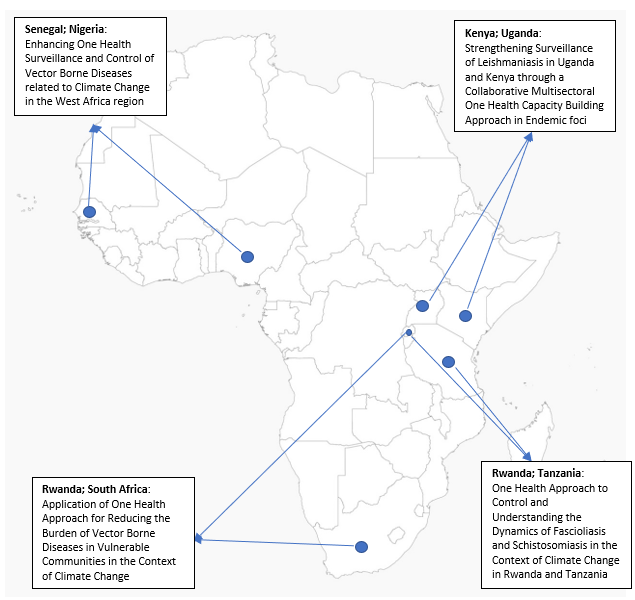TDR, WHO’s Department of Control of Neglected Tropical Diseases and the Climate, Health and Environment team at the WHO Regional Office for Africa are pleased to announce the selection of four research proposals which will address One Health implementation research priorities for vector-borne diseases in the context of climate change in Africa.
Vector-borne diseases (VBDs) are human illnesses caused by parasites, viruses and bacteria that are transmitted by vectors. Their burden remains highest in impoverished populations and in tropical and subtropical regions of the world. Alongside various environmental and social factors, climate change plays a significant role in the rising infectious disease burden of VBDs. Climate change can provide temperature-sensitive vectors and pathogens with ideal environmental conditions for their optimal development and survival, and can thus increase the geographical spread and transmission of VBDs. The study of ecological factors such as habitats and the interface of human, vector and host species is therefore crucial for understanding disease ecology and determining how best to control, manage and prevent VBDs.
Attempts to lessen the burden of VBDs face a number of challenges. One major challenge is the siloed way in which various sectors and stakeholders function. For example, a lack of integration, coordination and communication between the environmental, animal and human health sectors, and a lack of integration with the public health sector, causes a lack of public health system capacity. Other challenges include the lack of sustainable funding and investment, inadequate and inaccessible databases, and fragmented operations, technical and legal support.
It is these challenges that call for a One Health approach, which is defined by the One Health High Level Expert Panel (OHHLEP) as “an integrated, unifying approach that aims to sustainably balance and optimize the health of people, animals and ecosystems.” The approach “mobilizes multiple sectors, disciplines and communities at varying levels of society to work together to foster well-being and tackle threats to health and ecosystems, while addressing the collective need for clean water, energy and air, safe and nutritious food, taking action on climate change, and contributing to sustainable development.”
Scaling up One Health
Over the last few years, TDR has been developing and piloting a framework for operationalizing a One Health approach in African countries. Four pilot studies were completed last year, and TDR is now aiming to scale up the implementation of the One Health approach.
In an age where climate change poses one of the greatest threats to humanity, environmental considerations are crucial in gaining a full picture of VBD dynamics- Dr Brama Kone, Technical Officer, Climate, Health and Environment team at WHO/AFRO
In July 2022 a joint TDR/WHO call for research proposals was issued for consortiums of collaborating institutions in Africa to address One Health implementation research priorities for VBDs in the context of climate change. Four projects have now been selected from the applications (Fig. 1).
Over a one-year period, the research consortia from low- and middle-income African countries will collaborate on the ground to investigate ways in which One Health approaches can be effectively operationalized and implemented for the prevention and management of VBDs, to benefit at-risk and vulnerable communities.
These selected projects will contribute to WHO’s 2021–2030 road map for neglected tropical diseases, to the WHO Regional Office for Africa’s 2019–2029 strategic action plan to scale up health and environment Interventions in Africa and its 2022-2032 updated regional strategy for the management of environmental determinants of human health in the African Region.
Fig. 1. The four selected projects and countries involved in the collaborative research consortia.

For more information please contact: Dr Corinne Merle

